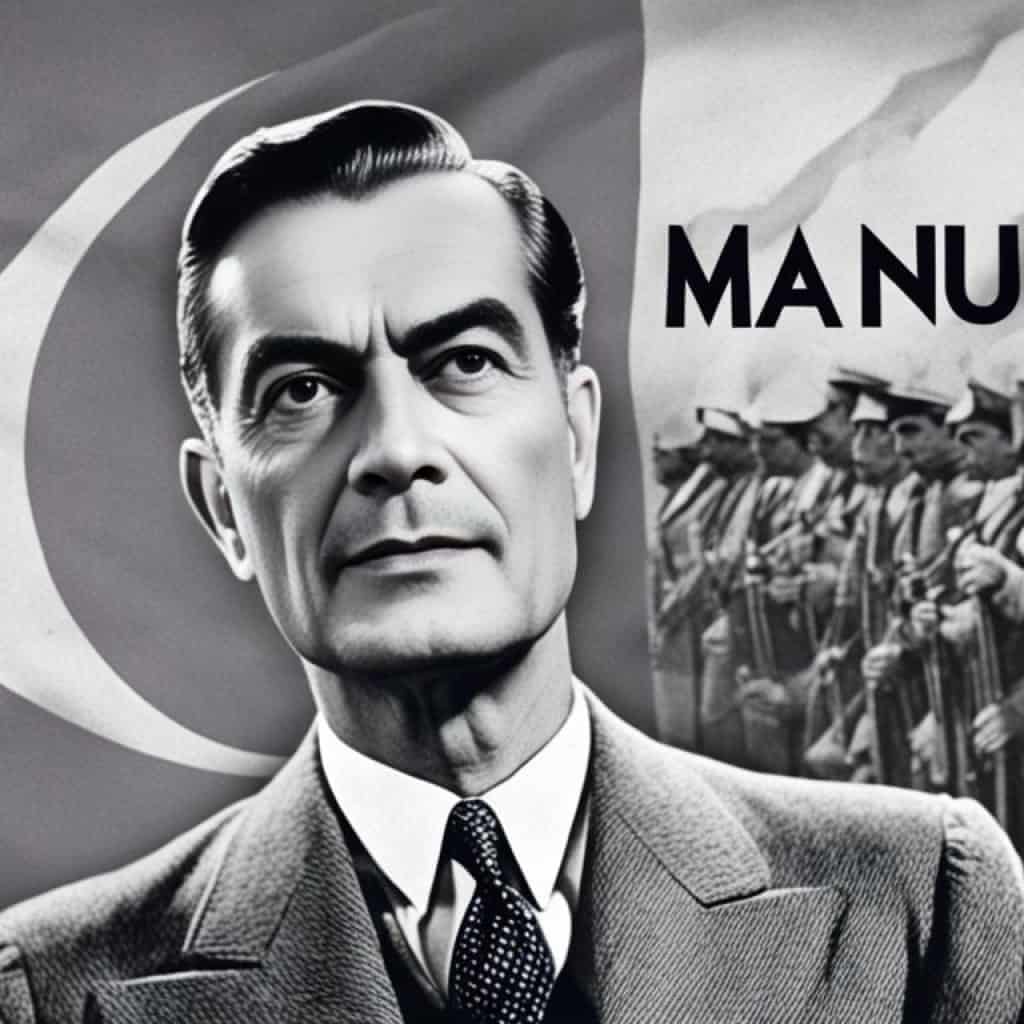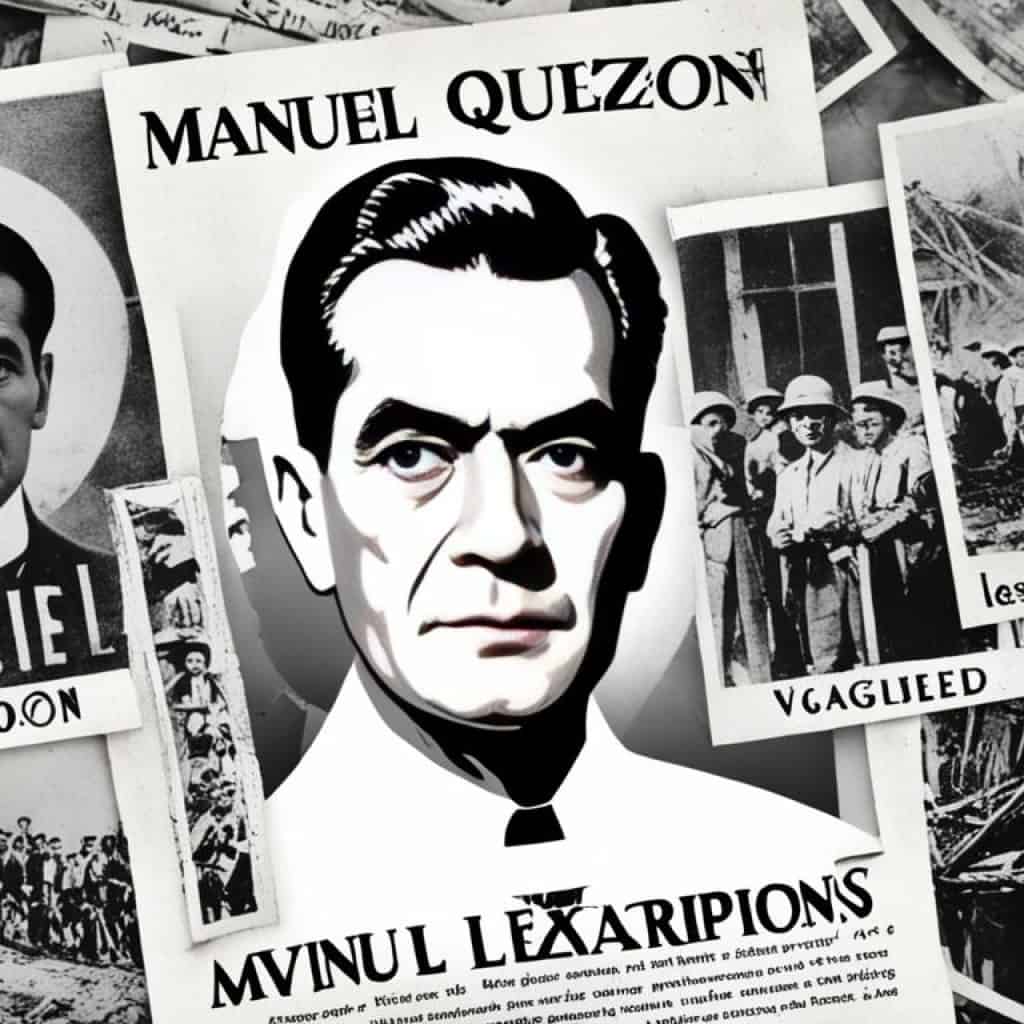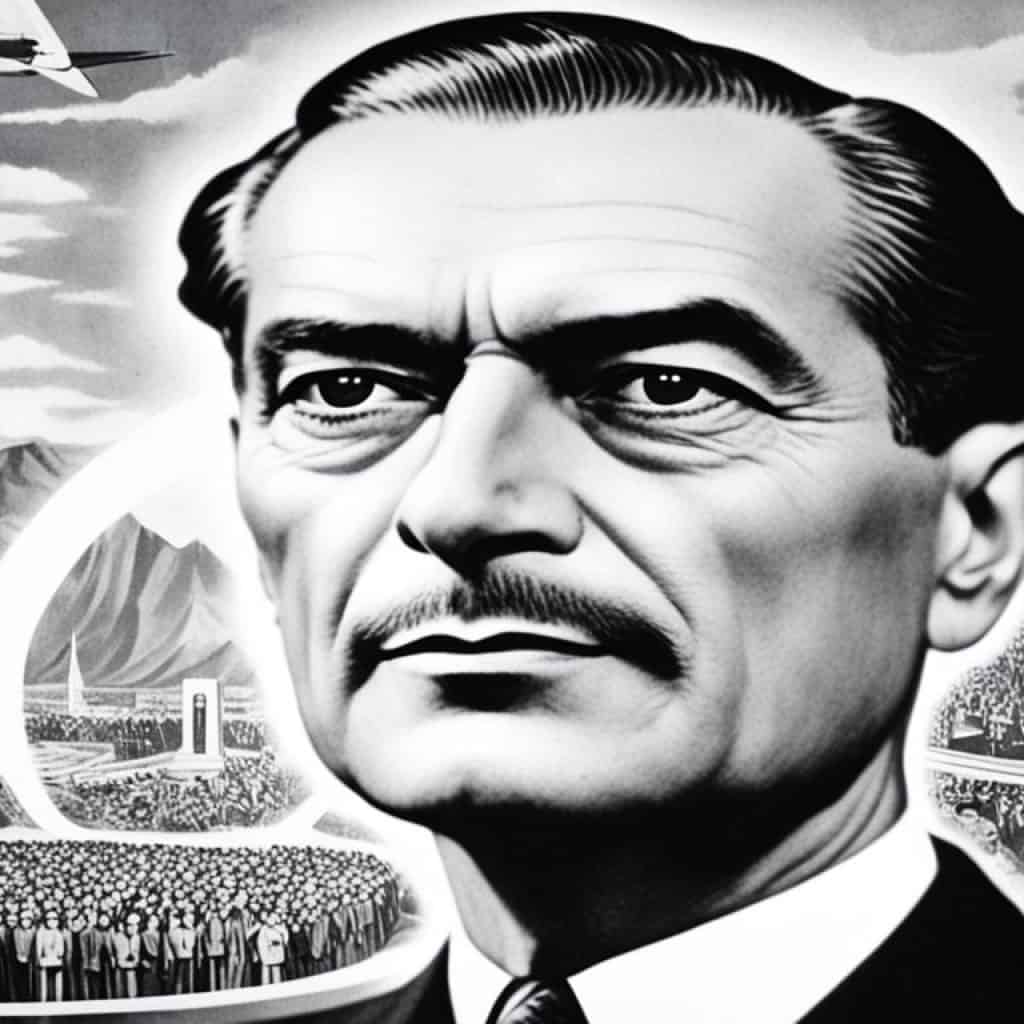When we think of influential leaders in Philippine history, names like Emilio Aguinaldo and Ferdinand Marcos often come to mind. But what about Manuel L Quezon? Have you ever wondered about the man whose legacy and achievements continue to shape the Philippines to this day?
From his pivotal role in fighting for independence to his presidency and policies, Quezon’s impact on the nation cannot be overstated. But what exactly did he contribute to the Philippines? What is Quezon’s legacy, and how does it continue to affect the country?
In this article, we will delve into the life and accomplishments of Manuel L Quezon, exploring his early life, his role in obtaining independence, his presidency, and his lasting influence on Philippine-American relations and Southeast Asia. If you’re curious about the man behind the name and want to deepen your understanding of Philippine history, then read on.
Key Takeaways:
- Manuel L Quezon’s contributions to the Philippines had a profound and lasting impact on the nation’s development.
- He played a crucial role in fighting for Filipino independence and securing legislative acts that paved the way for full independence.
- As the president of the Philippine Commonwealth, Quezon implemented various nationalist policies that promoted growth and development.
- Quezon’s legacy extends beyond the Philippines, as his leadership influenced Philippine-American relations and Southeast Asian nations.
- Understanding Quezon’s life and achievements is essential to grasp the historical significance of his contributions.
Early Life and Career
Manuel L Quezon, born into a family of Tagalog descent, had humble beginnings. His father was a schoolteacher and small landholder, instilling in Quezon a strong sense of education and responsibility. Growing up, Quezon witnessed the struggle for independence against the United States under the leadership of Emilio Aguinaldo, which fueled his passion for the Philippine independence movement.
Quezon’s pursuit of higher education led him to the University of Santo Tomás, where he studied law. However, he temporarily suspended his studies to actively participate in the independence movement. Realizing the importance of cooperation with the United States for achieving independence, Quezon returned to complete his law studies and obtained his legal qualifications.
Quezon’s experience in the early years of the Philippine independence movement, coupled with his legal background, laid the foundation for his political career. His commitment to the cause of independence combined with his strategic thinking and negotiation skills would prove instrumental in shaping the future of the Philippines.
“I believe that true independence can only be achieved through strategic cooperation with the United States.”– Manuel L Quezon
Notable Achievements
- Active participation in the Philippine independence movement
- Completion of law studies at the University of Santo Tomás
- Earned legal qualifications as a lawyer
- Realization of the importance of cooperation with the United States for achieving independence
Quezon’s Role in Obtaining Independence
Manuel L Quezon played a crucial role in the fight for Filipino independence. His relentless efforts and strategic lobbying were instrumental in securing the passage of key legislation that paved the way for the nation’s freedom.
| Legislation | Description |
|---|---|
| Jones Act (1916) | The Jones Act of 1916 marked a significant step towards Filipino independence. Quezon tirelessly advocated for its passage, resulting in a provision that promised eventual independence for the Philippines. This act affirmed the United States’ commitment to the self-determination of the Filipino people. |
| Tydings–McDuffie Act (1934) | In 1934, Quezon fought once again for Philippine independence, leading to the passage of the Tydings–McDuffie Act. This act granted the Philippines the status of a Commonwealth and laid the foundation for full independence after a transition period. It enabled the establishment of a government that would govern the country until the formal declaration of sovereignty in 1946. |
Quezon’s unwavering dedication and strategic negotiations were crucial in achieving these significant milestones towards Filipino independence. His vision and determination continue to inspire generations, reaffirming his place in history as a key architect of the nation’s emancipation.
Quezon’s Presidency and Policies
During his presidency of the Philippine Commonwealth from 1935 to 1942, Manuel L Quezon implemented a series of nationalist policies to drive the growth and development of the country. His administration focused on various key areas, including military defense, land reform, regional development, and governance.
Military Defense Reorganization
Recognizing the importance of a well-organized and modernized military, Quezon prioritized the reorganization of the Philippine armed forces. Under his leadership, the Quezon administration modernized the defense capabilities of the islands, ensuring they were better prepared to protect the nation’s sovereignty.
Tackling the Issue of Landless Peasants
In order to address the pervasive issue of landlessness among peasants, Quezon’s administration initiated land reform programs. These programs aimed to provide land and support to landless farmers, empowering them to build a livelihood and improve their living conditions. By redistributing land, Quezon sought to create a more equitable society that would benefit all Filipinos.
Promoting Settlement and Development in Mindanao
Mindanao, the southernmost island of the Philippines, was a region with vast untapped potential. Quezon recognized this and actively promoted settlement and development in the area. His administration encouraged migration to Mindanao, investing in infrastructure, agricultural projects, and industrial development to unlock its economic possibilities.
Fighting Graft and Corruption
Quezon was dedicated to eradicating graft and corruption in the government, believing that a clean and transparent administration was essential for national progress. He instituted measures to enhance accountability, strengthen anti-corruption policies, and foster a culture of integrity among public officials. Quezon’s administration endeavored to build a government that prioritized the needs of the Filipino people above personal gain.
| Quezon’s Nationalist Policies | Key Actions |
|---|---|
| Military Defense Reorganization | Modernizing the Philippine armed forces to ensure national security |
| Tackling the Issue of Landless Peasants | Implementing land reform programs to provide land and support for farmers |
| Promoting Settlement and Development in Mindanao | Encouraging migration, investing in infrastructure, and developing industries in Mindanao |
| Fighting Graft and Corruption | Implementing measures to enhance transparency and integrity in the government |
Under Quezon’s leadership, the construction of Quezon City, a new national capital, represented a visible symbol of progress and development. It served as a testament to the vision and determination of Quezon’s administration.

Quezon’s presidency was marked by his unwavering commitment to the welfare and prosperity of the Filipino people. His nationalist policies laid the foundation for a more empowered and independent nation.
Quezon’s Exile and Resistance during World War II
As World War II engulfed the world, the Philippines faced the brutal reality of the Japanese invasion in 1942. In the face of this grave threat to his nation, Manuel L Quezon made the difficult decision to go into exile in the United States, leaving behind a Philippines under occupation.
“I shall return.”
Quezon’s words echoed his determination to fight for the independence of the Philippines even from afar. In exile, he formed a government in exile, rallied international support, and became an active member of the Pacific War Council. As a steadfast leader, Quezon played a crucial role in resisting the Japanese occupation and collaborating with Allied forces to liberate the Philippines.
The Declaration of the United Nations
Quezon’s commitment to the cause of freedom extended beyond the borders of the Philippines. He played a significant role in signing the declaration of the United Nations against the fascist nations, firmly expressing his dedication to combatting tyranny and oppression.
The image above illustrates the weight of Quezon’s responsibilities and his unwavering determination to ensure a brighter future for the Philippines.
“We carry a solemn obligation to clean our homeland of the residue of military occupation and exploitation. We carry a solemn obligation to heal the wounds, to lift up the burdens, to build the broken places, to straighten out in whatever way we can the distortions brought about by military occupation and totalitarian exploitation.”
Quezon’s resilience and unwavering spirit during his exile symbolize the strength and determination of the Filipino people in the face of adversity. His leadership played a pivotal role not only in preparing for the eventual liberation of the Philippines but also in fostering international solidarity against oppression.
More than just a symbol of resistance, Quezon’s exile and resistance during World War II exemplify the indomitable spirit and unwavering commitment to freedom that defined his legacy.
Quezon’s Death and Legacy
Unfortunately, Manuel L Quezon succumbed to tuberculosis in Saranac Lake, New York, before witnessing the establishment of full Philippine independence. However, his legacy as a visionary leader and his contributions to the nation continue to be celebrated. Quezon is remembered for his significant role in the struggle for independence and his efforts to shape the future of the Philippines.
A visionary and staunch advocate for Filipino independence, Quezon dedicated his life to the cause of his country. Despite his untimely death, his influence and contributions remain etched in Philippine history. From his passionate pursuit of independence to his leadership as the first president of the Philippine Commonwealth, Quezon’s legacy serves as a powerful reminder of the resilience and determination of the Filipino people.
“The fight for freedom is far from over. It is our duty to continue the struggle, to shape the destiny of our great nation.” – Manuel L Quezon
Quezon’s legacy extends beyond his political achievements. His commitment to social justice, land reform, and the pursuit of economic progress left a lasting impact on Philippine society. His nationalist policies aimed at uplifting marginalized communities and creating a more equitable society continue to shape the nation’s development.
The Quezon Legacy
Quezon’s contributions to Filipino society and the nation’s struggle for independence are reflected in various aspects of modern-day Philippines. From the establishment of Quezon City as the new national capital to the ongoing efforts to promote inclusive governance, Quezon’s ideals continue to guide the nation.
| Quezon’s Legacy | Contributions |
|---|---|
| Leadership in the Independence Movement | Quezon played a pivotal role in advocating for Filipino independence, paving the way for the Philippines to finally achieve autonomy. |
| Philippine Commonwealth | As the first president of the Philippine Commonwealth, Quezon established a government that laid the groundwork for the country’s full independence. |
| Nationalist Policies | Quezon’s emphasis on nationalism and economic development shaped the country’s policies and fostered a sense of Filipino identity. |
| International Recognition | Quezon’s humanitarian efforts, particularly in aiding Holocaust victims, garnered international recognition and highlighted the Philippines’ commitment to human rights. |
Quezon’s death marked the end of a remarkable chapter in Philippine history, but his influence and legacy continue to resonate. His commitment to a united and progressive Philippines serves as an enduring inspiration for future generations striving to build a better nation.
Quezon’s contributions in shaping the Philippines’ destiny and his unwavering dedication to the Filipino people have secured his place among the country’s greatest leaders. His remarkable journey from a small town in Baler to the forefront of the independence movement remains a testament to the power of ambition, courage, and unwavering belief in the pursuit of freedom.
Quezon’s International Recognition
In 2015, the International Raoul Wallenberg Foundation posthumously bestowed the Wallenberg Medal on Quezon and the people of the Philippines. This recognition honored Quezon’s efforts to reach out to victims of the Holocaust from 1937 to 1941. It highlights the humanitarian actions taken by Quezon and the Philippines during a dark period in world history.
Wallenberg Medal: Honoring Quezon’s Humanitarian Actions
The Wallenberg Medal is a prestigious award presented by the International Raoul Wallenberg Foundation, named after Raoul Wallenberg, a Swedish diplomat who saved thousands of Jews during the Holocaust. The medal recognizes individuals or groups who demonstrate exceptional courage and compassion in rescuing and aiding those affected by genocide, ethnic cleansing, and other acts of mass persecution.
“Quezon’s efforts to assist the victims of the Holocaust were truly remarkable. At a time when many nations turned a blind eye to the horrors unfolding in Europe, Quezon and the people of the Philippines extended a helping hand to those in need. The Wallenberg Medal serves as a testament to Quezon’s unwavering commitment to humanitarianism.”
The Wallenberg Medal is a symbol of the international community’s appreciation for Quezon’s heroism and dedication to protecting the lives of others. It underscores the significance of his actions and the impact they had on the lives of countless Holocaust victims who found refuge in the Philippines.

Quezon’s Personal Life
Manuel L Quezon married Aurora Aragon in 1918, and together they formed a loving family. They had four children, and their union provided a strong foundation for Quezon as he embarked on his influential political career. Their shared experiences and support shaped Quezon’s character and decisions, showing the depth of his familial connections.
“The love and support of my family has been my driving force in pursuing my aspirations for our beloved nation.”
Quezon’s personal life offers a glimpse into the man behind the influential leader. It showcases his commitment to both his country and his family. Additionally, Quezon’s grandson, Manuel L Quezon III, has also made his mark in Philippine politics, carrying on the legacy of his esteemed grandfather.
Quezon’s Family
- Aurora Aragon – Wife
- Four children
Notable Family Member:
Quezon’s Impact on Philippine-American Relations
Manuel L Quezon played a pivotal role in shaping the relationship between the Philippines and the United States. Through his leadership and negotiations, he influenced the policies pursued by the United States regarding Philippine independence and economic development. Understanding Quezon’s influence is crucial to comprehending the dynamics of Philippine-American relations today.
Quezon’s active involvement in Philippine-American relations was instrumental in advancing the cause of Philippine independence. His tireless efforts and diplomatic skills paved the way for significant milestones, including the passage of the Jones Act, which pledged independence for the Philippines, and the Tydings-McDuffie Act, which granted full independence after the establishment of a Commonwealth government. Quezon’s influence resonates in the ongoing dialogue and cooperation between the two nations.
Quezon’s legacy as a proponent of Philippine-American relations extends beyond independence. He recognized the importance of economic cooperation and worked towards fostering stronger trade ties between the two countries. Quezon’s vision for a mutually beneficial relationship laid the foundation for future collaborations and partnerships in various sectors.
Quezon’s Legacy in Diplomacy
Quezon’s impact on Philippine-American relations extended beyond his presidency. His diplomatic endeavors and negotiations set the stage for a lasting partnership and shaped the foundation of bilateral ties. The friendship forged during his tenure continues to influence diplomatic interactions between the Philippines and the United States.
Philippine-American Relations Today
The influence of Quezon’s leadership on Philippine-American relations can still be seen today. The relationship between the two nations remains robust, encompassing not only political and economic cooperation but also cultural exchanges and people-to-people connections. The strong bond forged by Quezon’s initiatives serves as a testament to his enduring influence and contribution to the bilateral relationship.
Quezon’s Political Achievements
Manuel L Quezon’s political achievements are a testament to his exceptional leadership and unwavering dedication to the Filipino people. Throughout his career, he made significant contributions that shaped the political landscape of the Philippines and solidified his place in history.
“The true measure of leadership is not found in titles or positions but in the ability to navigate complex political situations and fight for the interests of the people.”
Quezon’s political journey began with his active involvement in the independence movement, where he played a pivotal role alongside notable figures such as Emilio Aguinaldo. His relentless pursuit of independence led to groundbreaking legislation and negotiations with the United States, ultimately paving the way for the establishment of the Philippine Commonwealth. Quezon’s unwavering commitment to Filipino independence is a cornerstone of his political achievements.
During his presidency, Quezon implemented progressive policies that prioritized the growth and development of the nation. He spearheaded reorganizations in the military defense, addressed the concerns of landless peasants, and promoted settlement and development in Mindanao. Additionally, his administration tirelessly fought against graft and corruption, ensuring that the government remained true to its purpose of serving the people.
Quezon’s visionary leadership extended beyond the shores of the Philippines. He actively participated in international affairs and served as a prominent voice in advocating for the rights and welfare of Filipinos globally. His efforts to reach out to victims of the Holocaust, documented in the Waldenberg Medal recognition, showcased his unwavering commitment to humanitarian causes even during tumultuous times.

Furthermore, Quezon’s ability to navigate the complex dynamics of Philippine-American relations cannot be understated. His negotiations with the United States influenced policies regarding Philippine independence and economic development, shaping the ongoing relationship between the two nations. Understanding Quezon’s influence is key to comprehending the current state of Philippine-American relations and the shared history of the two countries.
Quezon’s Political Achievements Summary
| Political Achievements | Impact |
|---|---|
| Role in the independence movement | Paved the way for the establishment of the Philippine Commonwealth |
| Implementing progressive policies | Promoted national development and fought against corruption |
| International recognition | Honored for humanitarian efforts, representing the Philippines internationally |
| Shaping Philippine-American relations | Influenced policies related to independence and economic development |
Quezon’s Contributions to Southeast Asia
Manuel L Quezon’s influential leadership extended far beyond the borders of the Philippines, leaving a lasting impact on Southeast Asia. His unwavering advocacy for independence served as a resounding example for other nations in the region, inspiring movements and shaping the course of history. Quezon’s contributions to Southeast Asia hold deep significance and offer valuable insights into the region’s struggle for self-determination.
Quezon’s Educational Background and Influence
Manuel L Quezon’s educational background played a crucial role in shaping his intellectual development and political career. He attended the Colegio de San Juan de Letran and the University of Santo Tomas, where he acquired the skills and knowledge that would pave the way for his future success.
Quezon’s time at the Colegio de San Juan de Letran exposed him to a strong foundation of education, instilling in him a thirst for knowledge and a desire to make a difference. This early education laid the groundwork for his later accomplishments.
At the University of Santo Tomas, Quezon further honed his intellectual abilities and embraced the importance of education in societal progress. His time at the university not only expanded his understanding of various subjects but also provided him with opportunities to develop critical thinking skills and leadership qualities.
Quezon’s educational experiences significantly influenced his political career. Armed with a well-rounded education, he was able to navigate complex issues and effectively advocate for the interests of the Filipino people.
In addition to his personal educational journey, Quezon’s influence on the educational system in the Philippines is noteworthy. Recognizing the importance of education in nation-building, he pushed for the expansion and improvement of educational institutions across the country.
Quezon once said, “I am keenly aware that the future progress and welfare of our country depend on an enlightened, intellectually sound, and morally upright citizenry. This can only be achieved through a robust and accessible educational system.”
Through his efforts, Quezon aimed to create opportunities for all Filipinos to receive a quality education, regardless of their socio-economic background. His dedication to education continues to shape the educational landscape of the Philippines today.
Quezon’s Impact on the Educational System
Quezon’s influence on the educational system in the Philippines was far-reaching. He believed that education was the key to national development and progress.
During his presidency, Quezon prioritized educational reforms and policies aimed at expanding access to education, improving the quality of instruction, and creating a more inclusive educational system.
Some of his notable achievements include:
| Education Reforms | Impact |
|---|---|
| Establishment of the National Language Institute | Promoted Filipino as the national language and championed linguistic nationalism. |
| Expansion of public school infrastructure | Increased accessibility to education for rural and marginalized communities. |
| Creation of the Commission on National Language | Standardized the Filipino language and fostered national unity. |
| Promotion of vocational and technical education | Provided practical skills training for students to enhance employability. |
| Investment in teacher training and professional development | Elevated the quality of instruction and improved teaching methods. |
Quezon’s visionary approach to education has left a lasting legacy in the Philippines. His commitment to fostering an educated and empowered citizenry continues to shape the educational landscape, ensuring that future generations have access to quality education.
Conclusion
Manuel L Quezon’s contribution to the Philippines is immeasurable. As a key figure in the struggle for independence and the first president of the Philippine Commonwealth, Quezon’s vision and leadership left an indelible mark on the nation’s history. His undeniable impact on the Philippines is recognized both at home and abroad.
Quezon’s historical significance lies in his pivotal role in shaping the future of the country. From his tireless efforts to obtain Filipino independence to the implementation of nationalist policies during his presidency, Quezon’s dedication to the betterment of the Filipino people is evident in his achievements.
Today, Quezon’s enduring legacy continues to inspire and guide the Filipino people. His commitment to the pursuit of independence, his resilience during challenging times, and his unwavering dedication to serving the nation serve as a source of inspiration for future generations. Manuel L Quezon’s historical significance is a testament to his lasting impact on the Philippines.


















Hello , may i ask you why you share that kind of flag behind the image of President Manuel Quezon ? as far as I know there has never been a flag of that type, which among other things looks a lot like that of Argentina and Honduras…
Regards
Paolo P.
President of the Kapisanan ng Vexilolohiyang Pilipino
https://www.facebook.com/groups/Phils.Vex.Assn
it was a stylized art image, I have replaced it due to the incorrect flag representation. Thank you!